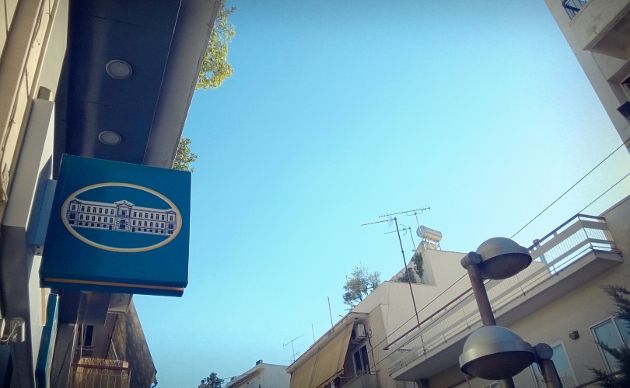-
 Is the Greek green transition running out of power?
Is the Greek green transition running out of power?
-
 Podcast - Walking a tightrope: Greece’s geopolitical balancing act
Podcast - Walking a tightrope: Greece’s geopolitical balancing act
-
 From nice story to pulped fiction: Carney delivers reality check on rules-based order
From nice story to pulped fiction: Carney delivers reality check on rules-based order
-
 Record bonds, rising bills: Greece’s economic paradox
Record bonds, rising bills: Greece’s economic paradox
-
 Podcast - Tax cuts and balancing acts: Greece's 2026 budget
Podcast - Tax cuts and balancing acts: Greece's 2026 budget
-
 Podcast - Main character energy: Greece vies for leading fossil fuel role
Podcast - Main character energy: Greece vies for leading fossil fuel role
NBG strengthens capital at deep discount, falls short of initial target

Following Alpha and Eurobank, National Bank (NBG) announced on Thursday evening the successful completion of its book building process as far as the international institutional offering is concerned.
The bank said it has raised a total of 1.17 billion euros so far, including the outcome of the voluntary bond swap offer (LME). Since the LME resulted in a capital strengthening of 691 million euros, the book-building process appears to have resulted in an equity raising of 475 million.
NBG said it will also launch a Greek public offer for new shares on or around November 30 for a targeted amount of 300 million. Alpha and Eurobank raised capital and fully covered their capital shortfall only via the international institutional offering.
After the the ECB’s Single Supervisory Mechanism (SSM) approved capital actions worth 120 million euros, NBG’s capital needs were reduced to 1.46 billion under the baseline and at 4.48 billion under the adverse stress test scenario.
Summing up, NBG has secured so far a capital strengthening of 1.17 billion euros and if the proceeds of the Greek offer are in line with the targeted 300 million, it would cover the baseline capital shortfall of 1.46 billion.
Since the bank aims for state aid to cover its total capital needs, the remaining bonds from the LME (111 million) plus the 197 million US preference shares will be bailed-in, resulting in a further capital boost of 308 million.
Overall, under the assumption of a successful Greek offer and including the burden sharing measures (bail-in), NBG would strengthen its capital by a total of 1.77 billion euros via private investor participation.
The bank would then seek state aid of 2.71 billion euros to cover its total capital shortfall. This figure is higher than the 2 billion initially suggested by the management on November 3 when it presented its capital plan. This largely reflects the lower proceeds from the equity offering, which reached 775 million (475 million from the institutional and 300 million from the Greek offer) compared to the initially targeted 1.6 billion.
According to the Greek bank recapitalisation legal framework, the state aid will be provided in the form of Contingent Convertible Securities (CoCos) (75 percent) and common shares (25 percent). In absolute figures, the state aid of 2.71 billion for NBG would correspond to 2.03 billion euros in CoCos, with an annual coupon of 8 percent (interest expense of 162 million) and 677 million euros in common shares.
NBG noted on November 3 that part of the proceeds from the sale of its entire stake (100 percent) in Finansbank (not expected within 2015) will be used for repaying CoCos. This was confirmed by the SSM on November 17.
Offer price
What was surprising, though, in the NBG announcement was the offer price, which was just 0.02 euros. This represents a deep discount of 93.8 percent on Thursday’s closing price of 0.32 euros. NBG's discount is also materially higher than that of Alpha (34.4 percent) and Eurobank (52.4 percent) announced earlier this week.
The bank will also proceed with a reverse split (1:15) since the offer price cannot be lower than the minimum price of 0.30 euros allowed by law.
As in the case of similar transactions by other Greek banks, the significant discount of the offer price compared to the market price is common practice in capital increases, particularly those conducted via a bookbuilding process, where the offer price is determined by the market (i.e. investors’ demand) and not by the bank.
Based on our calculations, NBG's equity raising of 1.77 billion from private investors coupled with state aid of 677 million in common shares would result in a marked reduction of the Hellenic Financial Stability Fund's (HFSF) participation in the bank’s share capital. It would be halved to 28.4 percent from its current level of 57.24 percent.
NBG's current market cap stands at 1.13 billion euros and is the highest among the four systemic Greek banks. Its stock has plunged 20 percent this week and 52.9 percent since the announcement of its capital shortfall on October 31 and 73.3 percent since the imposition of capital controls.
*Manos Giakoumis is the head analyst at MacroPolis. You can follow him on Twitter: @ManosGiakoumis